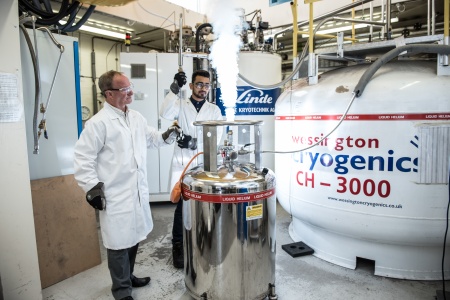Thursday, 14 November 2019
A new report from the University of Nottingham highlights the equality, diversity and inclusion (EDI) challenges facing technicians working in higher education (HE).
For the first time, using quantitative data and qualitative findings from national workshops and presentations, the new report identifies key EDI challenges and makes recommendations to institutions to advance equality for everyone working in the sector.
The report - ‘Equality, Diversity and Inclusion (EDI): A Technician Lens’ - is launched on 14 November at the STEMM-CHANGE annual conference at the Royal Society of Chemistry.
 Staff and trainee technician working with Cryogenics
Staff and trainee technician working with Cryogenics
The report found;
- In both Physics and Engineering, only 11% of technicians are female.
- There is a general decline in the number of female technicians from the age of 30
- The majority of technicians with managerial positions are male, even in subject disciplines where the majority of technicians are female.
- Just 10% of technicians are of BAME ethnicity.
- 30% of technicians are over the age of 51, reflecting reports that the technical community is ageing, with large numbers of skilled technicians retiring every year, taking their skills and experience with them.
- In Physics and Engineering, 45% of technicians are over 51
- Many technical staff were unaware of the EDI challenges they faced within their own community, and were unfamiliar with initiatives such as the Athena Swan and Race Equality Charters.
The technical community is critical to the success of the UK’s HE sector. They provide support which is essential for research and teaching and many are researchers and teachers in their own right.
Historically, initiatives to advance EDI in HE have focused on academic and research staff, however the expansion of the Athena Swan Charter to include professional and support staff has ignited a greater interest in EDI of non-academic staff groups, such as technicians.
Technician’s roles are being increasingly recognised through the Technician Commitment – a sector-wide initiative to ensure visibility, recognition, career development and sustainability of technical skills and roles within UK HE and research.
STEMM-CHANGE is an EPSRC-funded Inclusion Matters project aiming to drive a positive change in culture and practices in EDI across Science, Technology, Engineering, Mathematics and Medicine (STEMM).
It has been working with Technician Commitment signatories, the University of Liverpool and the John Innes Centre, and the Science Council, to highlight and address EDI challenges facing the technical community.
Technicians are vital to the future success of all of our universities. They underpin the high quality education we deliver to our students and the innovative research we are delivering to address the future challenges of society. Our EPSRC funded STEMM-CHANGE project is designed to put in place a toolbox of real solutions to a number of ED and I challenges across the STEMM sector and I am delighted we are able now to make a number of recommendations which we hope will help address some serious issues in our Technician community.”
 Research technician - Dr Brian Atkinson
Research technician - Dr Brian Atkinson
Recommendations include:
- Ensuring EDI initiatives, both sector and institutional, are inclusive of technical roles
- Better succession planning to avoid losing skills as technical staff head towards retirement
- More support for female and BAME technicians wanting to move into leadership and management roles
- The promotion of outreach activities aimed at encouraging people from a wider range of backgrounds into technical careers
- More investment in needed in apprenticeship and trainee technician programmes to ensure succession of technical talent
Kelly Vere, Director of Technical Skills & Strategy at the University of Nottingham, said: “Technicians are vital to universities and research institutes. Our report offers the first step to understanding and improving EDI in the technical community in UK higher education. By working together to increase awareness and recognition of EDI challenges, and by designing and implementing interventions to address them, we can advance equality, diversity and inclusion for all.”
Story credits
More information is available from Kelly Vere, Director of Technical Skills and Strategy at kelly.vere@nottingham.ac.uk
Notes to editors:
About the University of Nottingham
Ranked 97 in the world and 17th in the UK by the QS World University Rankings, the University of Nottingham is a founding member of Russell Group of research-intensive universities. Studying at the University of Nottingham is a life-changing experience, and we pride ourselves on unlocking the potential of our students. We have a pioneering spirit, expressed in the vision of our founder Sir Jesse Boot, which has seen us lead the way in establishing campuses in China and Malaysia - part of a globally connected network of education, research and industrial engagement.
Nottingham was crowned Sports University of the Year by The Times and Sunday Times Good University Guide 2024 – the third time it has been given the honour since 2018 – and by the Daily Mail University Guide 2024.
The university is among the best universities in the UK for the strength of our research, positioned seventh for research power in the UK according to REF 2021. The birthplace of discoveries such as MRI and ibuprofen, our innovations transform lives and tackle global problems such as sustainable food supplies, ending modern slavery, developing greener transport, and reducing reliance on fossil fuels.
The university is a major employer and industry partner - locally and globally - and our graduates are the third most targeted by the UK's top employers, according to The Graduate Market in 2024 report by High Fliers Research.
We lead the Universities for Nottingham initiative, in partnership with Nottingham Trent University, a pioneering collaboration between the city’s two world-class institutions to improve levels of prosperity, opportunity, sustainability, health and wellbeing for residents in the city and region we are proud to call home.
More news…